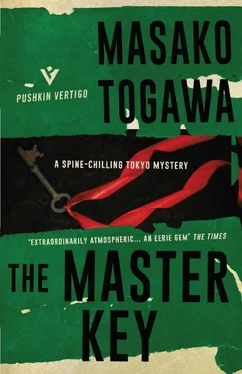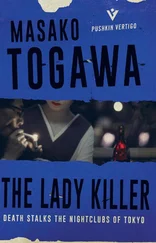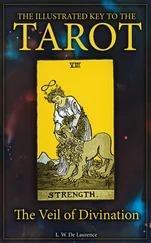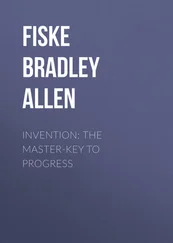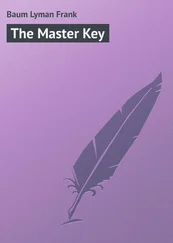She had spent the whole afternoon disguising the milk bottle she had stolen earlier. It was her habit to turn them into Mexican-style pitchers, or flower vases, or pot-bellied containers by covering them with papier mâché and decorating them with distemper and water-colours.
‘This should do it,’ she would mutter. ‘Must hide the fingerprints, or else…’
By the time it was dusk, she had completed yet another little handicraft to join those she had made before. She looked at it with pleasure, wiping her paint-stained fingers on an old newspaper. Then she suddenly noticed the date on the page.
It was ridiculously old—26 January 1933. It was one of the newspapers in the bundle she had found that morning. It had been folded in four, and the edges were yellow with age.
If it had just been old, that in itself would have amounted to nothing much. But somehow the date seemed to ring a bell in her head—was it not the same as that appearing on the main noticeboard downstairs? A few days earlier, someone had put a notice there offering a high price for a newspaper of about that date. If it was, then her morning find was just like a prize-winning lottery ticket. Could her luck have taken such a turn for the better? Pausing only to wash her hands, and to smooth the paper out and press it flat between a pile of magazines, she hurried down to the noticeboard in the entrance hall. She read the notice carefully.
HIGH PRICE PAID
I am seeking a copy of any daily newspaper dated Monday, 26 January 1933. If you have such a paper, please leave it with the clerk on duty, and I will collect it and leave a good reward with her.
It was the same date! Her mind full of mixed emotions, she paced up and down the hall wondering what to do. If she received any income, she was supposed to report it to the Social Security office. What exactly was meant by ‘High Price’? Until she knew, would it not be better to keep her find to herself? She felt the gaze of Miss Tojo burning into her back from where she sat behind the window and so hurried back upstairs before she could be drawn into conversation.
That night, as she lay curled up in her lair inside the cupboard, it suddenly occurred to her that she had not yet even read the paper. Why on earth would anyone want such an old newspaper? What could be its value? It wasn’t as if anything of particular historical interest had happened on 26 January 1933. She got the paper out from the pile of magazines and, placing it close to the 5-watt bulb, read it with mounting emotion.
The clue was on the crime page. Under a headline ‘Famous Guarnerius violin stolen’ there appeared a large photograph of a balding middle-aged foreigner dressed in a greatcoat and carrying a violin case.
The text that followed described how André Dore, having completed a five-year contract as a professor at a musical academy, was about to return home. He had been invited to give two farewell concerts in the Hibiya Concert Hall, but on returning to his hotel at the end of the first one he had opened his violin case and discovered that someone had substituted a cheap instrument for his precious Guarnerius. It was probable, but by no means certain, that the crime had occurred in the Concert Hall. The police had no clues as to the criminal’s identity. As M. Dore had gone straight back to his hotel by car, and had not let go of the violin case throughout the journey, it seemed clear that the switch had taken place during the few short minutes he had placed the case on a table in his dressing room after the concert. Of course, there were many visitors, so to have taken the violin, case and all, would have been no particular achievement in itself, but to exchange the contents of the case without being detected seemed little short of a conjuring trick, if not impossible.
What really caught Noriko’s attention was one of the names at the bottom of the column. Various people had been interviewed, and amongst them was a name known to her—Suwa Yatabe, who lived on the first floor of the same apartment block. She was quoted as follows:
‘It truly grieves me that my teacher should suffer this tragic loss, just as he was leaving Japan, a country he has grown to love. I hope the thief will hasten to return the violin. The only person who can get the full effect from that violin is the Professor himself.’
The article went on to say that Suwa Yatabe was the Professor’s favourite pupil. As she read this, Noriko pictured Suwa in her mind as she always saw her in the corridor of the building, holding herself erect and looking every inch a musician.
And for the first time she realised why she had always felt some unconscious affinity for Suwa. It was because they were both thieves.
Noriko felt sure of it. Thirty years ago, Suwa had left her fingerprints on the violin. And how could she hope to remove them from that varnished surface? She felt an overwhelming desire to see those fingerprints for herself. And just as earlier, Miss Tamura had been tempted to pry in the room of her classmate, Toyoko Munekata, and had turned to the master key, so now was Noriko drawn by the same magnetic force of the key which was in her possession. She took it out of the tea caddy; suddenly it had become a treasure beyond worth. She squeezed it between her fingers, examining it minutely from every angle as she imagined herself using it to enter Suwa’s room. She saw herself looking at the stolen violin. And after her long day’s work decorating the milk bottle, she fell asleep with these pleasant thoughts on her mind.
The unending rain which had washed the bricks of the apartment all day persisted into the evening. The damp spread up the staircase and along the corridors, making the air heavy and oppressive. Suwa Yatabe finished the last lesson of the day and led her pupil to the front porch. She opened the child’s umbrella.
‘Take care how you go!’
‘Yes, Teacher. Bye bye!’
She watched the small figure bobbing through the rain as far as the tram stop. The cold rain occasionally blew in under the eaves, dampening her face. The chill of the stone floor crept up into her body. Age seemed to have blunted her sense of hot and cold. She felt lethargic, with no particular desire to go back to her room and make supper. After seeing the last child off every day, particularly on rainy evenings, she felt overwhelmed by an unpleasant sadness.
She pushed the heavy door to and made her way back into the apartment block. She could see Miss Tamura at her desk behind the receptionist’s window. She was knitting; the needles seemed to be moving unduly slowly.
As Suwa passed the noticeboard, her eye fell on a new notice that she had not observed before. She hardly took it in until the date mentioned—26 January—struck home. This notice which so coolly required a copy of a thirty-year-old newspaper seemed to her to have a deeper motive. Clearly it was aimed at her. That was the date which had been burned into her memory for thirty years. In fact, that particular day’s paper lay hidden in the recesses of her chest of drawers together with the newspapers in which she had first made her appearance on the music page all those years ago.
Her astonishment gradually changed to a blend of anger and unease. Even when the woman who lived next to her greeted her as she returned from work, Suwa didn’t seem to notice. She just stood in front of the board as if blind and deaf to the world. She sensed that the great and final drama of her life had hung over her head for all those years, but had never seemed as if it was about to break until today.
She went back to her room and sat down in front of the piano. She remained there in that position all night without getting a wink of sleep. Every now and again she would look up at the old violin case on top of the three-cornered bookshelf. The famous Guarnerius had slept away the last thirty years up there. A few times each year, Suwa had taken it down and played a few notes on it, just to confirm that its tone was as beautiful as ever.
Читать дальше
